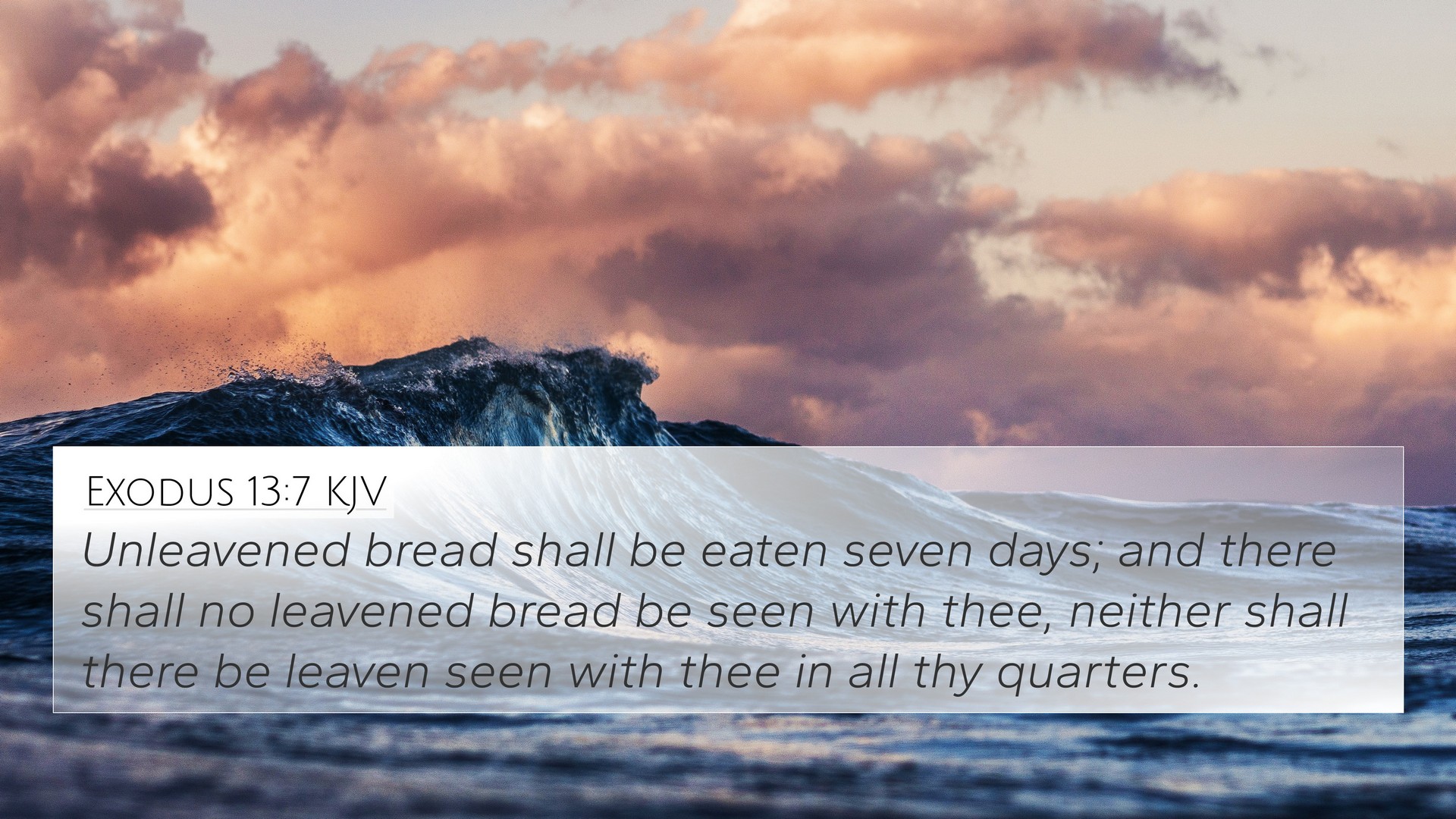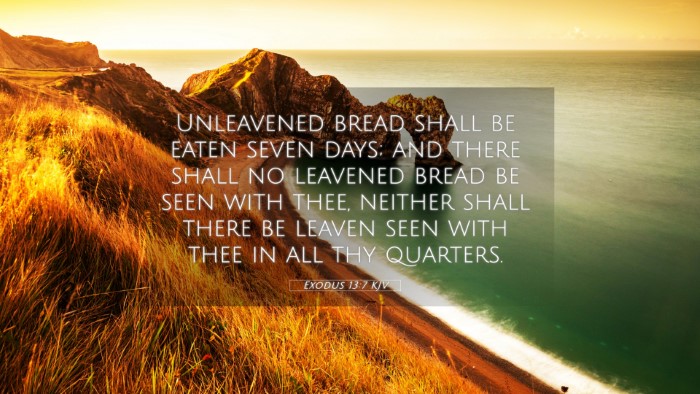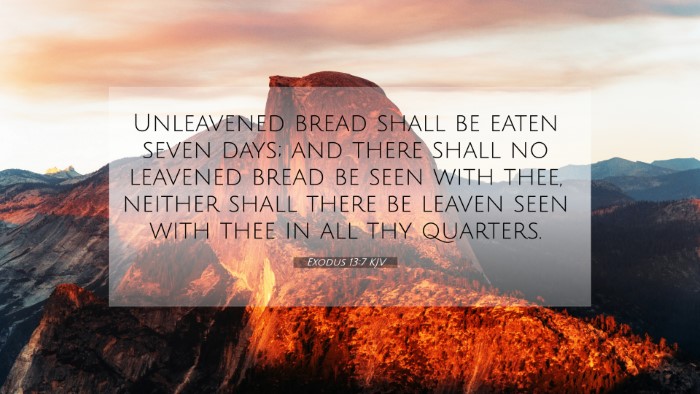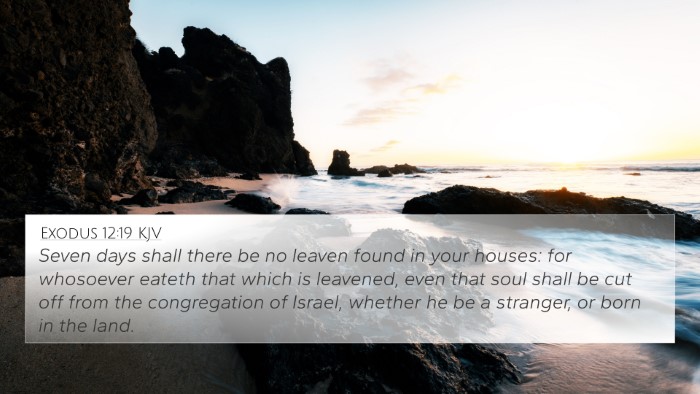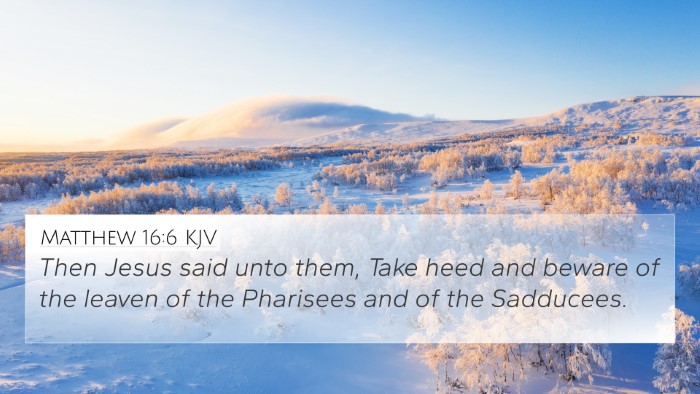Understanding Exodus 13:7
Exodus 13:7 states, "Unleavened bread shall be eaten throughout the week; and there shall no leavened bread be seen with thee, neither shall there be leaven seen with thee in all thy quarters." This verse is part of the Mosaic covenant, emphasizing the significance of unleavened bread in the Passover celebration and its theological implications. The practice of not consuming leavened bread during this time serves as a symbol of purity and separation from sin.
Commentary Insights
Insights from public domain commentaries highlight the cultural and spiritual dimensions of this command:
- Matthew Henry: Henry underscores that leaven often symbolizes sin and corruption in the Scriptures. By avoiding leaven, the Israelites were reminded of their deliverance from bondage and the need for a holy walk.
- Albert Barnes: Barnes notes the historical context, explaining the urgency for the Israelites to leave Egypt quickly, which is represented by the haste of unleavened bread preparation. It signifies the necessity of being spiritually vigilant and prepared for God’s deliverance.
- Adam Clarke: Clarke emphasizes that this command foreshadows the New Testament theme of Christ as the “Bread of Life,” linking the absence of leaven to the holy nature of Jesus, who is without sin.
Thematic Connections
Exodus 13:7 serves as a rich ground for thematic connections across the Bible:
- Passover and Deliverance: Leaven's absence during Passover reflects the ultimate deliverance from Egypt (Exodus 12:15).
- New Testament Symbolism: Leaven’s symbolic connection to sin is echoed in Jesus' teachings (Matthew 16:6) and Paul’s exhortations (1 Corinthians 5:6-8) to purge out the old leaven.
- Holiness and Separation: The call to be distinct from the ways of the world is a recurring theme, seen in other passages like 2 Corinthians 6:17 that instruct believers to come out from among them.
- Manna from Heaven: The consumption of unleavened bread feeds into the narrative of God providing sustenance (John 6:31) and highlights Jesus as the true bread that gives life.
- Festival of Unleavened Bread: Instituted alongside Passover (Leviticus 23:6), it remains a vital observance for Israel, signifying continual remembrance of God’s redemption.
Cross-References
This verse is connected to several important Biblical texts that emphasize similar themes of purity and obedience:
- Exodus 12:15: Instructions for the Feast of Unleavened Bread, reinforcing the command to remove leaven.
- 1 Corinthians 5:7-8: Paul instructs to keep the feast with sincerity and truth, removing the old leaven.
- Matthew 16:6: Jesus warns against the leaven of the Pharisees, illustrating the corrupting influence of hypocrisy.
- Galatians 5:9: Paul mentions that a little leaven leaveneth the whole lump, stressing the pervasive nature of sin.
- Leviticus 23:6: Discusses the Festival of Unleavened Bread, tying it back to the themes in Exodus 13.
- Luke 22:1: References the Feast of Unleavened Bread in relation to the plot against Jesus, showing its continuity into the New Testament.
- John 6:35: Jesus declares Himself the Bread of Life, fulfilling the symbolism of unleavened bread.
Conclusion
The importance of Exodus 13:7 extends beyond mere dietary restrictions; it symbolizes the call to spiritual purity, the urgent need for readiness in the face of God’s deliverance, and the foreshadowing of Christ’s redemptive work. By delving into this text and its cross-references, we see a coherent scriptural narrative that connects the Old and New Testaments through the themes of holiness, obedience, and the nature of Christ.
Tools for Further Study
To explore these connections more deeply, consider utilizing:
- Bible concordance for thematic searches.
- Bible cross-reference guide for comparative studies.
- Cross-reference Bible study tools for identifying interconnections.
- Bible reference resources for sermon preparation and thematic research.
Encouragement for the Reader
As you study Exodus 13:7, allow the Holy Spirit to illuminate the Word, revealing how these ancient texts remain relevant to your spiritual journey today. Engage in cross-referencing these passages to enrich your understanding and practice of faith.
